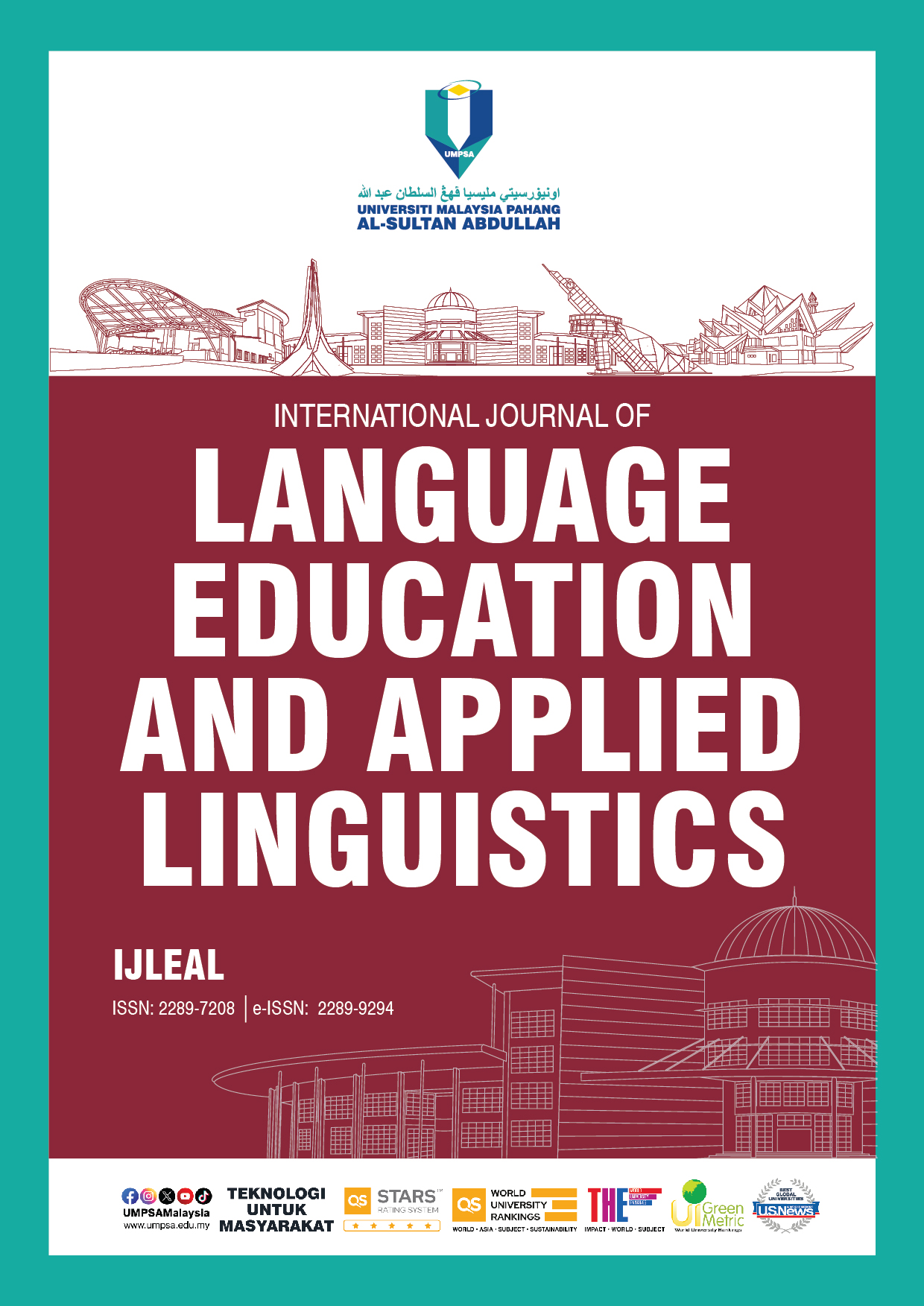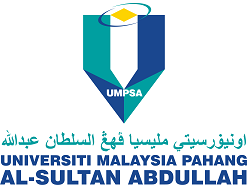Students’ Anxiety and Attitudes towards Writing at Sekolah Menengah Kebangsaan Sungai Baging
DOI:
https://doi.org/10.15282/Keywords:
Productive skills, Secondary school students, Writing anxiety, Writing attitudeAbstract
This study examined the challenges faced by rural secondary school students in writing, focusing primarily on their anxiety and attitudes towards this skill. Grounded in Krashen’s Affective Filter Hypothesis, it examined how affective factors, such as anxiety and attitudes, influence second language writing performance. Local secondary students, particularly those in remote areas, often encounter difficulties in English writing, largely due to anxiety and negative attitudes that impede their performance and motivation. Therefore, exploring ways to address these emotional challenges is indispensable for enhancing writing outcomes, as recognising students’ anxiety can improve writing instruction and foster a supportive classroom environment. A quantitative survey design was utilised, focusing on three key aspects: variations in writing anxiety by gender, proficiency, and educational level; differences in attitudes towards writing; and the correlation between writing attitudes and anxiety. A 40-item, five-point Likert scale agreement questionnaire was adapted and distributed to 300 students aged between 12 and 17 years from SMK Sungai Baging, Kuantan. Results were analysed using an independent samples t-test and Pearson correlation coefficient. Results indicated moderate levels of writing anxiety and attitudes, revealing a significant positive correlation between anxiety and attitudes. Higher levels of anxiety and negative attitudes were associated with low self-confidence and diminished creativity. Consequently, writing classes should incorporate engaging activities and constructive feedback to foster positive attitudes and alleviate anxiety. Further in-depth research is recommended with larger samples, particularly in Malaysian rural secondary schools.
References
Ahmed, S. A., Othman, B. J., Gardi, B., Sabir, B. Y., Ismael, N. B., Hamza, P. A., Sorguli, S., Aziz, M. H., Ali, J. B., & Anwar, G. (2021). Students’ attitudes towards learning English in the Kurdistan region of Iraq. International Journal of English Literature and Social Sciences, 6(3), 72–87. https://doi.org/10.22161/ijels.63.11
Ansarimoghaddam, S., & Tan, B. H. (2014). Undergraduates’ experiences and attitudes toward writing in L1 and English. Journal of Language Studies, 14(2), 7–28.
Bakhtyari, M. B., & Kassim, H. (2022). English language speaking anxiety among Afghan university students. Journal of Curriculum and Teaching, 11(8), 238.
Bora, P. (2023). Importance of writing skills in developing students’ communication skills. Journal for Research Scholars and Professionals of English Language Teaching, 7(35), 1–6. https://doi.org/10.54850/jrspelt.7.35.009
Camacho, A., Alves, R. A., De Smedt, F., Van Keer, H., & Boscolo, P. (2021). Relations among motivation, behaviour, and performance in writing: A multiple‐group structural equation modelling study. British Journal of Educational Psychology, 91(4), 1456–1480. https://doi.org/10.1111/bjep.12430
Cheng, Y. (2016). A measure of second language writing anxiety: Scale development and preliminary validation. Journal of Second Language Writing. https://doi.org/10.1016/j.jslw.2004.07.001
Cocuk, H. E., Yelken, T. Y., & Ozer, O. (2016). The relationship between writing anxiety and writing disposition among secondary school students. Eurasian Journal of Educational Research, (63), 335–352. https://doi.org/10.14689/ejer.2016.63.19
Creswell, J. W., & Creswell, J. D. (2017). Research design: Qualitative, quantitative, and mixed methods approaches (5th ed.). SAGE Publications.
Cuong, P. (2021). English language education in rural areas: Current issues, complexities and ways forward. VNU Journal of Science: Education Research, 37(4), 39–48. https://doi.org/10.25073/2588-1159/vnuer.4538
Dhadhodara, N., & Joshi, B. (2017). The writing attitude of higher education students. Horizons of Holistic Education, 4(3–4), 111–120.
Dong, K., Swan, C. K., & Kassim, H. (2021). Exploring Tertiary ESL Learners’ Affective Attributes Toward Online Reading. Premise: Journal of English Education and Applied Linguistics, 10(2), 137-149. https://doi.org/10.24127/pj.v10i2.4172
Dyer, J. E. & Osborne, E. W. (1999). The influence of science applications in agriculture courses on attitudes of Illinois guidance counsellors at model student-teaching centres. Journal of Agricultural Education, 40(4), 57–66. https://doi.org/10.5032/jae.1999.04057
Elbow, P. (1998). Writing with power: Techniques for mastering the writing process. Oxford University Press.
Haryanti, D. U., Rasyid, F., & Wahyuni, S. (2022). Path analysis on writing anxiety, writing attitude, language awareness, and writing achievement of university students. English Learning Innovation (ENGLIE), 3(1), 85–99. https://doi.org/10.22219/englie.v3i1.19657
Hossain, M. M., Alam, M. A., & Masum, M. H. (2022). Prevalence of anxiety, depression, and stress among students of Jahangirnagar University in Bangladesh. Health Science Reports, 5(2), e559. https://doi.org/10.1002/hsr2.559
Ismail, N. H., Yusof, H., & Musa, K. (2020). The development of good practices for English language teacher redeployment policy implementation in Malaysia. International Journal of Humanities, Philosophy and Language, 3(12), 13–28. https://doi.org/10.35631/IJHPL.312002
Issa, S. H., & Shyamala, K. (2021). Improvement of the cognitive ability of English language learners through writing skills. Psychology and Education Journal, 58(1), 5457-5472. https://doi.org/10.17762/pae.v58i1.1859
Jabali, O. (2018). Students’ attitudes towards EFL university writing: A case study at An-Najah National University, Palestine. Heliyon, 4(11). Article e00896. https://doi.org/10.1016/j.heliyon.2018.e00896
Jawas, U. (2019). Writing anxiety among Indonesian EFL students: Factors and strategies. International Journal of Instruction, 12(4), 733–746. https://eric.ed.gov/?id=EJ1230040
Kormos, J. (2023). The role of cognitive factors in second language writing and writing to learn a second language. Studies in Second Language Acquisition, 45(3), 622–646. https://doi.org/10.1017/S0272263122000481
Krashen, S. D. (1982). Principles and practice in second language acquisition. Pergamon Press.
Krashen, S. D. (1987). Applications of psycholinguistic research to the classroom. In M. Long & J. Richards (Eds.), Methodology in TESOL (pp. 33–44). Heinle & Heinle.
Pan, C., & Zhang, X. (2023). A longitudinal study of foreign language anxiety and enjoyment. Language Teaching Research, 27(6), 1552–1575. https://doi.org/10.1177/1362168821993341
Rafanello, D. (2008). Writing well: It’s all about attitude. Professional Writing Exchange, 58–59.
Ramanathan, V., & Atkinson, D. (1999). Individualism, academic writing, and ESL writers. Journal of Second Language Writing, 8(1), 45–75.
Ramzan, M., Javaid, Z. K., Kareem, A., & Mobeen, S. (2023). Amplifying classroom enjoyment and cultivating positive learning attitudes among ESL learners. Pakistan Journal of Humanities and Social Sciences, 11(2), 2236–2246. https://doi.org/10.52131/pjhss.2023.1102.0522
Ratha, I. L., & Shah, P. M. (2018). The anxiety and attitude of Malaysian secondary students towards learning the English language. In Proceedings of the Language for Specific Purposes Global Academic and Business Conference (pp. 151–160). https://seminar.utmspace.edu.my/lspgabc2018/Doc/27.pdf
Razali, M. K., Abdul Rahim, A. A., & Khamis, N. Y. (2023). Mind-mapping strategy in process writing approach: Idea extension, evidence for an introductory paragraph. International Journal of Language Education and Applied Linguistics, 13(2), 40–52. https://doi.org/10.15282/ijleal.v13i2.9433
Sari, E., & Han, T. (2024). The impact of automated writing evaluation on English as a foreign language learners’ writing self‐efficacy, self‐regulation, anxiety, and performance. Journal of Computer Assisted Learning, 40(5), 2065-2080. https://doi.org/10.1111/jcal.13004
Setyowati, L. (2017). The eighth graders’ writing attitude toward EFL writing in the Indonesian context. International Journal of Languages Education, 5(3), 422–433.
Shan, L. W., & Aziz, A. A. (2022). A systematic review of teaching English in rural settings: Challenges and solutions. International Journal of Academic Research in Business and Social Sciences, 12(6), 1956-1977. http://dx.doi.org/10.6007/IJARBSS/v12-i6/14233
Udu, T. T. (2021). Teachers’ and students’ attitudes towards reading and writing: Do they correlate with students' achievement in English? Studies in English Language and Education, 8(1), 143–156. https://doi.org/10.24815/siele.v8i1.17524
Zhan, H., Zheng, C., Zhang, X., Yang, M., Zhang, L., & Jia, X. (2021). Chinese college students’ stress and anxiety levels under COVID-19. Frontiers in Psychiatry, 12, Article 615390. https://doi.org/10.3389/fpsyt.2021.615390
Zhang, H. (2011). A study on ESL writing anxiety among Chinese English majors- causes, effects and coping strategies for ESL writing anxiety. Dissertation. Kristianstad University, School of Education and Environment.
Zulkefly, F., & Razali, A. B. (2019). Malaysian rural secondary school students’ attitudes towards learning English as a second language. International Journal of Instruction, 12(1), 1141–1156. https://doi.org/10.29333/iji.2019.12173a
Zheng, Y. (2024). Empirical study of second language writing anxiety and writing proficiency among English majors. In Hu, Z.,
Zhang, Q., He, M. (eds) Advances in Artificial Systems for Logistics Engineering IV. ICAILE 2024. Lecture Notes on Data Engineering and Communications Technologies, vol 223. Springer, Cham. https://doi.org/10.1007/978-3-031-72017-8_36
Downloads
Published
Issue
Section
License
Copyright (c) 2025 The Author(s)

This work is licensed under a Creative Commons Attribution-NonCommercial 4.0 International License.




